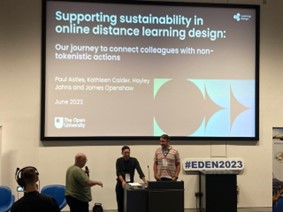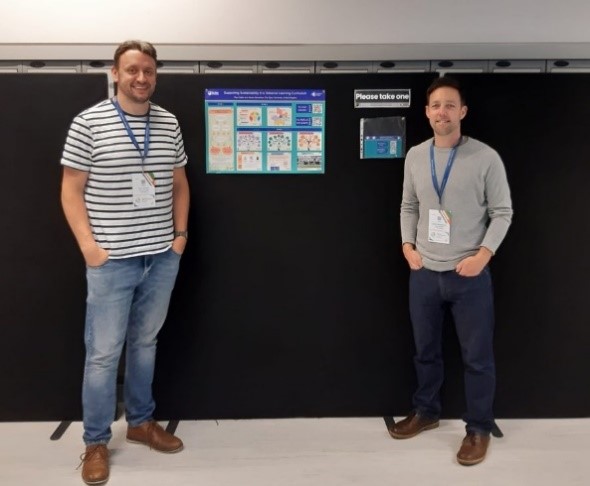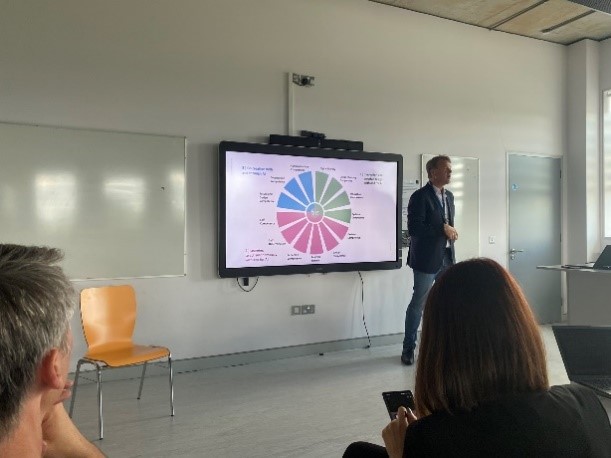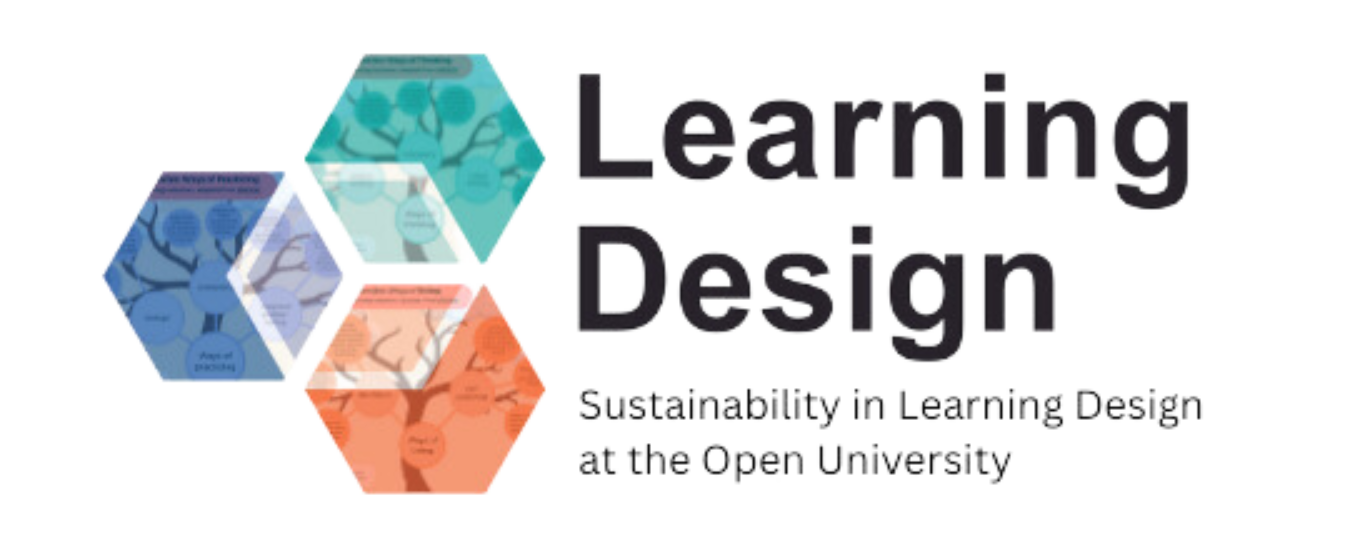James Openshaw and Paul Astles ~ Learning Designers
This article is the first of a two-part reflection about our collective experience at the EDEN 2023 conference in Dublin, Ireland and the EAUC conference 2023 in Bath, England. Alongside our shared experience and takeaways from those events this blog post will also include an update about the work going on in the Open University Learning Design Team in relation to sustainability and where we are heading next.
Before we get to the exciting stuff about our own work let’s look back at our personal highlights and takeaways from the most recently attended conferences.
As explored in an earlier OU LD blog post about reflections from the OER23 conference, taking everything in at a conference can be a little overwhelming at times. You can also check out the OU LD Twitter account to see our live tweets and takeaways from EDEN and EAUC. You will get a good flavour of our experiences and it may prompt you to consider in more detail the various talks that were presented. The reflections in this blog post are a curated version of our own personal highlights. First up, EDEN 2023.
EDEN conference 2023
Our work at the conference can be seen on Open Research Online (ORO). ORO is the Open Access repository of research outputs from The Open University’s research community. The service is publicly accessible and can be browsed and searched freely. Our submissions to the conference can be accessed directly here: What is non-tokenistic sustainability in a distance learning curriculum? and Supporting Sustainability in a Distance Learning Curriculum.
If you’d like to hear us talk you through the work, our presentations are available on YouTube:
- What is non-tokenistic sustainability in a distance learning curriculum? (10 mins) – In this talk we explore what we are doing along with how to initiate conversations about sustainability in design.
- Supporting sustainability in online distance learning (5 mins) – In this talk we explore how we have collated information and a specific example of how to use one of our resources.

You can also see us delivering this short GASTA talk in ‘real life’ at the conference on the EDEN YouTube channel.
Paul’s reflections on the conference
The EDEN experience was a bit of whirlwind. Flying to Dublin on a Saturday, working on and missing Father’s Day for the first time was quite an emotional start to the weekend for me. Lots of video calls home helped though. However, it was a real honour to represent the work of the Learning Design Sustainability group at this year’s EDEN conference and something that I really enjoyed.
There were a lot of interesting talks at the conference on a wide range of topics. I’ve picked some personal highlights from each day of the conference for this section of the blog post.
Day 1: The first highlight for me would have to be setting up our poster on Day 1 (see image below).

The poster wall was in the main break space at EDEN and it allowed us to discuss our work and network with a wide range of delegates. There were lots of interesting discussions about how sustainability connects in different contexts.
Day 2: This was a very busy day, lots of talks that I personally enjoyed listening to and reflecting on. Regarding sustainability, on day 2 it was interesting to see how micro-credentials were being used to connect to different sustainability development goals and using student feedback to improve the content. One way in which our work compliments that approach is the use of student input in the design of meaningful experiences of sustainability in the learning journey for students.
There was an excellent talk about the future skills that employees may need in a world connected with AI. Work is going on to define and refine a series of competencies to underline these future skills (image below).

Staying with the theme of AI for a moment, some incredibly interesting work was explored by the University of London who used an AI chatbot that drew responses from curated course related information provided by academics. This was used alongside regular Tutor support to encourage students to reflect on course materials by asking the AI about the course material. It allowed students to refine what they wanted to ask their tutors in what was described as a safe 1:1 environment.
Day 3: Another busy day at EDEN. I am going to home in on two highlights here. The first is the notion that evidence synthesis is like looking at a whole galaxy rather than focusing on just one star. An eloquent way to consider the process of reviewing the literature.
I’ll conclude my section of this article by drawing on something shared when considering the concept of ‘Openness in Education’. The concept of a journey is key to our work. Bringing people on a journey from their starting point to somewhere slightly further along the path towards sustainability. This notion also connects well with openness in education. Not everyone will have a shared understanding of what it means to be ‘Open’. I would encourage you to consider where you are on that journey.
James’ reflection on the conference
This was the first conference I had been to since being at the OU and it was a valuable experience. The programme was packed with many relevant and interesting sessions and was attended by over 300 delegates from 35 countries so there was a great amount of diversity in views and approaches. This was the first face-to-face EDEN conference since the pandemic and along with the rise of AI and ChatGPT, the theme was very much about how HE institutions can respond to these ground shaking events and thrive going forward.
One of the talks that explored this raised the question of what the role of the university is at the current time. This question was linked to thinking about how a university can contribute to the employability of students. In this fast changing, tech-driven world, students can gain skills and experience in HE institutions, but they don’t really know what kind of jobs will emerge in the future. Therefore, the role of HE institutions is to help students to be prepared for the unknown and uncertain. This means teaching critical thinking skills, digital literacy skills, self-reflection, and offering courses that upskill and reskill, preparing students for lifelong learning so they can adapt to this changing world. It therefore means universities need to understand the current trends in the job market and be aware of new emerging jobs so they can offer relevant courses to students.
Another interesting session was a workshop on AI titled ‘Disentangling the Hype, Hyperbole and Hysteria in the Face of Artificial Intelligence’. It stimulated debate on how AI is affecting education, the role of the teacher, assessment design and academic integrity. A very relevant point that came out from the discussion was the need to teach students to become competent at being critical of AI content. This raised the view that digital literacy now needs to include critical AI literacy. Another interesting idea that links with the new emerging skills of the future is that of students needing learn to become ‘prompt engineers’ – being skilled at prompting AI to produce the right results.
As I currently work as a learning designer in the Microcredentials team, I was naturally keen to attend talks and workshops on the topic of short courses. One talk I went to explored whether Microcredentials are a good fit for all higher education institutions and the challenges of implementing them successfully. The session was interactive with the participants responding to poll questions throughout. It was interesting to see how many institutions were already involved in exploring Microcredentials or had courses up and running.
Indeed, the professor who ran the session, who was from the Open University of Catalonia, talked about how he saw 2023 as the year of the microcredentials, with more and more institutions becoming active in this area with investment being dedicated to it. By way of example, he mentioned that the Spanish government is investing 50 million euros over the next 2 and a half years in short courses to encourage growth and development. Nevertheless, the agreement in the room was that there is still a lot to work out, not least in getting a consensus on what Microcredentials actually are in terms of credit and course length. There is also work to do with the academics to ensure they understand how to effectively write for short courses, and for them to see the value in these modules. It is clear to see that this is where learning design can become a valuable support.
Finally, I can’t end without mentioning one of the talks Paul and I presented at the conference. On the final day we delivered a GASTA talk, a short 5-minute presentation. Prior to the conference we didn’t suspect that this was anything much, but it turned out to be a big event with the talks being in the lecture hall and a compère pumping up the audience before each talk with a countdown and the threat of cutting off anyone’s talk that went over the allotted 5 minutes.
It was fairly nerve-wracking but once we were up and delivering it was a great experience. Our presentation was on supporting sustainability in online distance learning design and explaining what we have done so far and the resources we have created. It was a great opportunity to share how we have explored embedding sustainability in our courses and what we intend to do next.
Sustainability in the design of distance learning
Key takeaways from our work so far:
-
- Focus on identifying non-tokenistic actions that can meaningfully support change, knowledge building or skills development.
- Create opportunities for student input into resource design– their ideas, comments and critiques are invaluable.
- Recognise that everyone’s journey towards taking meaningful non-tokenistic actions to embed sustainability will be different.

What next?
-
- Delivering a 60-minute workshop at the ALT conference in September 2023. This will showcase some practical actions that can be taken and challenge the audience to consider how they might work in their own context.
- Refining ‘skill cards’ which can be used in the design process to support academics to connect with the UNSECO sustainable competencies and help integrate these competencies into learning experiences. These are being co-created with student input in the design process.
- Evaluating the impact of our work.
A final question
We want to leave you with this question :
When considering sustainability in learning design, where are you at on your journey towards what non-tokenistic actions look like in your context?
If you can, please do take a moment to let us know what your response is by mentionting (or @-ing) us via our Twitter account.
Banner image: National Botanic Gardens in Dublin; via Canva

